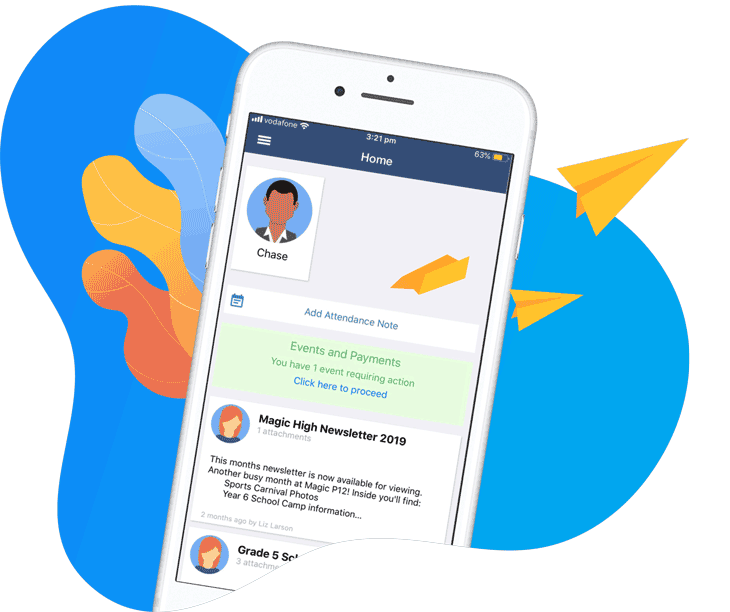We had the pleasure of speaking with Deputy Principals, Frances Ward and Dee Ryan. They spoke in-depth about the positive impact the software has had on their school.
For context, Loreto Bray is a large comprehensive Girl’s secondary school with over 700 students. Since our Ireland launch in 2016, Compass has over 70 schools. Compass Ireland, like UK and Australia, focus heavily on creating a community of schools who can speak to, meet with and learn from each other – in and out of the MIS software we provide.
This case study interview has been broken into two parts, focusing on the MIS product and features that have made the lives of the staff at Loreto Bray easier. With the first part focusing on the onboarding process, why they switched and how their experience with our team and community has been which you can read here.
It’s no secret that schools are a very fast-paced environment. It’s important that you’re able to communicate easily and effectively between staff, parents and students. How has Compass helped you feel more connected as a community?
Frances Ward: Well, I think one of the big things is when you need to contact a group of students, in the past you would nearly have to physically go in, get each one’s email address or send them a letter. Whereas now with Compass, you just go into the class group, click on send email, and the email goes off to the entire class group. Same with parents as well. I find that hugely beneficial. It’s just such a time saver. So that aspect of communication between students and teachers and between teachers and parents has been hugely enhanced by using Compass.
Dee Ryan: Yeah, I definitely agree with that. We also used to have everything in separate drives. And now everything is in the same place so that nobody’s left out of the information. Even down to our merit system. It used to be written in the students’ journal and [would remain unseen] unless a teacher took up the journal to say, “oh, let’s see what merits you’ve got”. Where-as now a student can walk into class having received a merit just a few minutes before and the teacher can say, “Oh, I saw you got a merit. That’s great stuff!”. And it just enhances that kind of positivity. Positivity that we want to have around the school.
Frances Ward: The other huge benefit for us with parents is the Newsfeed. When we were starting to look at our strategic plan, we got a group of teachers together as a school development planning team. And one of the key things that emerged from various different dialogues between parents, between teachers, between students, was the lack of communication. So with Compass that has just done a complete 360 where the parents are now up to date and every day they’re getting information on the Newsfeed. They know about the second year hockey team, they know there’s an upcoming trip, they know there’s a staff meeting. You know, it’s really, really created a strong connection between home and school. So that newsfeed has been really beneficial.
We also use the contents of the Newsfeed for people who don’t have access to Compass, [by compiling] it into an article and that goes to the local paper and immediately the entire community knows what’s happening up there in Loreto Bray. So that’s been fantastic. And the feedback from the parents, anecdotally through the parents association meetings, I’ve heard, “This is brilliant! You know, we really know what’s going on.” So that’s been great.
Dee Ryan: The one other thing is that parents in real time can see where their students are. And if they’re not where they’re supposed to be, they can spot it immediately. Which obviously, if they can see that in real time it just enhances the support that we can give to students and their parents to make sure that everybody is fully supported and present and looked after in school.
How has Compass helped with tracking student attendance?
Dee Ryan: Oh, it’s huge. Our old system was very clunky, Compass is so much easier because you can distil things into different groups, different classes, different years. For example, if you suspect that something is happening in a particular year group, you can go in and check through the day or through the week “Mm, what has the attendance has been like?”. Or if you suspect a particular group of students, it’s completely accessible, totally straightforward. Even when a parent is coming in and you want to discuss supports you want to put in place, you can see it gives you a report of the classes that they’ve missed. So it’s not even just the days they’ve missed, but the class they’ve missed in terms of say, maths. Okay. They’ve missed X number as opposed to their overall attendance, which is much better. So you can infer that they’re avoiding maths class and we need to have a look at that. And those things are really, really important in prepping for reports but also for parent teacher meetings.
Frances Ward: Yeah, it is great when you have parents who come in and there is an issue with attendance and they say, “oh no, but she, she’s in school all the time!” and then I just switch the laptop around and say, “okay, now look at her month by month”. And Compass have colour coded it so it’s visual for everybody, but it just makes it really easy for parents to see. It’s just fantastic from that point of view.
How has Compass impacted things like events or trips at your school?
Frances Ward: It’s really made the entire staff aware of what’s actually going on in the school. In the past, our transition students would’ve been taking part in loads of different trips throughout the year and teachers wouldn’t really know and you’d encounter questions like “Where are the fourth years today?”.
Where-as now they know exactly because once they go into their register they see a fourth year is missing from their class, they just hover over the name and it’ll say “she’s at an equestrian meeting” or “she’s at a swimming gala” or whatever. So it has impacted hugely on events. It’s also streamlined supervision for events as well. So when we organise events, it allows us then to see what teachers have been freed up as a result of this event having been created.
You’ve got a much better handle on what’s going on in the school with the events. That’s one thing we were very surprised at when we rolled out Compass initially, we thought, well this year we’ll just get the teachers to call the register and we were quite happy with that. And after about maybe three weeks in September they had mastered the register and they were actually coming to us and saying, “I actually discovered that on Compass I can create an event|. And we said, “oh my this is fantastic!” So by the end of the year, staff were creating events, we were doing the parent-teacher meetings through Compass, obviously they were calling the register, they were putting in the attendance, everything. So it’s really taken off for the teachers because they can see the benefit of it on a day-to-day practical level.
Dee Ryan: And it’s tightened it, so there’s a structure there and the students know that.
Frances Ward: Exactly. They know that every teacher is aware of where the students should be.
Dee Ryan: And their parents know what time they’re supposed to leave and what time they’re supposed to be back. So students can’t say I was at a football match for seven hours. They know they’re supposed to leave at 10am and they know they’re supposed to be back at 1pm and they know that the attendance will be taken and everybody can see where they’re supposed to be. So it’s tightened all of that up. That’s amazing. Because again, it’s to be able to see everything in one place.
Like Francis was saying, in the morning when we’re doing supervision, it’s a big part of our job that supervision substitution, you have to make sure that everybody’s supervised. And so if you don’t have to go looking up student timetables to see what teachers are freed up, if you just literally hover over something and it gives you the list of people you can put into the right place, it makes a big difference. In terms of being able to deal with other things in the morning. I have to get the supervision done and I cannot deal with teachers coming in. Whereas if I can get it done quickly, then people can come in to me or parents or students with whoever needs to, but the supervision has to be top priority.
What does it mean to have your staff be more independent? What impact has that had on your school?
Dee Ryan: Well, the first thing is I think that staff should be autonomous. They shouldn’t have to come to us for every piece of information. We’re not the gatekeepers of all the information. We’re not precious about it. The school runs better when everybody has the information that they need at their fingertips and they don’t have to go searching for it. And when they have that information, it makes them more empowered to do other things beyond just coming in in the morning and leaving in the evening. They’re able to connect with their students in a different way. They’re able to connect with our school as a community in a different way. So that’s the first thing.
The second thing is, before all that information was on a file in our computer and every time someone wanted something, they’d have to come and knock on our door. Which everybody only needs two minutes, but we have a hundred staff here. Our community without our parents is close to a thousand. If everybody needs two minutes of our day, nothing can get done. We can’t move the school forward, we can’t make sure that everything is being done. So taking all that away and just making it accessible to everybody has made our days so much easier. It’s made our lives easier in terms of being able to get to things we never would’ve been able to do.
Frances Ward: I think another huge benefit would be from the SEN point of view. Where children who would have Special Educational Needs, a teacher can now see straightaway in their class. If they hover over, we’ll say Mary’s name, it shows she has dyslexia and needs assistance with reading. Every teacher is now aware of what every child’s educational plan is because they can see it there in front of them. That makes a huge difference. If somebody has a nut allergy or somebody has to use an EpiPen, every teacher has access to that information. So you’re reducing the risk all the time. Now, don’t get me wrong, sometimes teachers mightn’t look at it, but at least we’re confident that that information is there.
Dee Ryan: And it’s time saving for the teachers as well. Before they would’ve had to go into a drive and students weren’t necessarily grouped in their classes and it was confusing and hard to find. Whereas now they go into their class and they can see there are little, say red or yellow boxes for particular students and there’s strategies and little tips and tricks to be used with that particular student for that particular class. So it doesn’t just give us back time, it gives all of our teachers back time as well, you know, it’s great. That’s incredible.
You mentioned Compass adds visibility in regards to SEN students. Has it helped in any other ways to improve what is available for those students?
Frances Ward: Absolutely. In the past, you would be given your class list at the beginning of the year, your 20 students. And a lot of times teachers would just assume it’s a mixed ability class, they would just go and teach a mixed ability class. But now all of a sudden they realise they’ve got, maybe a high achiever in the class. They realise they’ve got somebody who has to be taken out for resource hours for maths. So now all of a sudden you’ve got a very diverse group in front of you. So you’re now able to plan your classes without having to go looking for anything, you can see clearly -I have two high achievers in my class, so I need to make sure that I have additional questions for these girls.
I’ve two girls who maybe have English as their second language. I have to make sure that I’ve worksheets for that. So having that information readily available on the screen, as Dee said, once you go in and pull up your class to call your register, you can see exactly who you’ve got in front of you.
Even for bereavements, a simple thing like that, “Mary’s grandmother has passed away during the summer”, you forget teachers forget that information. But yet it’s really important. It’s important for the teacher in how they manage the class. It’s important for them to know this child is vulnerable at the moment. Whereas we, we all might be told at the beginning of the year, okay, you know, X, Y and is Z has happened. But as we all know, schools are fast. Like you just get going and you forget that information. But when it’s there in front of you on your register and you can see it every day, it does make a difference.
Dee Ryan: Yeah. And then I think as well, the landscape of what we call SFL – Support for Learning – at our school. That landscape has changed massively in the last few years. So even to the extent of say our English as an additional language, we would have a number of Ukrainian students now in the last couple years, so to be able to group those students together is helpful. And even in terms of designing the way the timetable can work back to back, and when we can communicate with teachers that those students will have EAL in these classes or this week they’re having a particular speaker or whatever. So those supports can be improved. And similarly, like I said before, if there’s a student struggling in a particular subject, we’re able to spot that quicker. The teachers can spot it quicker.
Schools are so fast, I’m teaching let’s say nine classes in a day, I’m not noticing that Mary is missing every Tuesday morning and every Thursday afternoon because I have all of these other students take care of. Whereas when I call up my register, then I’m able to see it straight away and I can think “maybe there’s something here”. I need to speak to that student. “Do I need to access supports for that student? Is that student in need of some kind of an assessment?”.
All of those things are just much more readily available than in the older system, which was very separate. Because we all do have responsibility to look after our SFL students. That is on every teacher. It’s not about the SFL department. And so it brings those things together again, as opposed to, that happens over there in the SFL department, which is what it used to be, but it’s not that anymore. It’s for all of our staff. That’s incredible. And it just becomes more embedded as a whole staff initiative.






